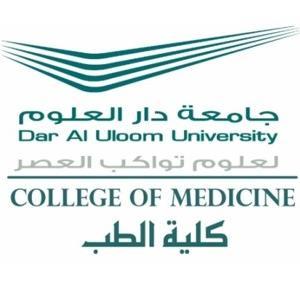Curriculum
Education shifted worldwide from a traditional passive “teacher-centred” approach to an active “student-centred” learning. This model focuses on what the students expected to be able to do at the end of the module or programme according to specific predetermined (outcome-based education). The College of Medicine at DAU implemented the reformed undergraduate medical curriculum form King Saud University medical school. The curriculum is consistent with the requirements of the Saudi Arabia Qualifications Framework (SAQF).The college identifies its graduate attributes and intended learning outcomes by adapting the SaudiMEDs framework. The SaudiMEDs framework is similar to the other global professional competency-based frameworks including, but not limited to, CanMEDs , Tomorrow’s Doctors , the Scottish Doctor, and the Netherlands National Qualification Framework .The SaudiMEDs specify the learning outcomes and enable competencies that are expected from all medical graduates in Saudi Arabia. SaudiMEDs competencies derived from an analysis of patient’s and society’s needs .Therefore, SaudiMEDs competencies aim to help Ministry of Health and other Health Care Providers to achieve the goal of improving the experience of health care and improving the health of populations. In addition, it encompasses a combination of knowledge, skills and behaviour, combined to improve performance. SaudiMEDs framework developed by the medical colleges’ deans’ committee and accepted as the main reference for program accreditation within the Kingdom of Saud Arabia by NCAAA. In addition, Saudi Commission for Health Specialties were given the responsibility to assess graduates from all medical schools to ensure that physicians entering practice have met and achieved the set out learning outcomes in the document .
. The SaudiMEDs framework is composed of six major themes that describe physician’s duties and obligations. These six themes are further detailed to seventeen Program Learning Outcomes (PLOs). In addition, PLOs are classified according to National Qualification Framework (SAQF) domains. Including, Knowledge (Theoretical and Factual) , Skills (Practical application of knowledge) and Values (Competence and Interpersonal skills) .Furthermore, these seventeen PLOs are further detailed to seventy seven course-level learning outcomes/competencies.
The alignment between the Graduate Attributes , PLOs and SAQF Domains
|
Graduate Attributes |
SaudiMed FrameworkTheme | PLOs | SAQF Domain |
| Graduates with Scientific approach to medical practice | Scientific Approach to Practice | PLO1: S1. Integrate basic, clinical, behavioural and social sciences in medical practice | K |
| PLO2: S9. Practice evidence-based health care | S | ||
| Patient centered practitioner | Patient care | PLO3: S3. Demonstrate the essential clinical skills and procedures | S |
| PLO4: S4. Use clinical reasoning, decision making, and problemsolving skills in medical practice | S | ||
| PLO5 :S5. Manage patients with life-threatening medical conditions | S | ||
| PLO6: S5: Manage patients with common medical problems | S | ||
| PLO7: S7. Place patients’ needs and safety at the centre of the care process | S | ||
| Community oriented practitioner | Community oriented practice | PLO8: K1. Describe and Adhere to the regulations of Saudi healthcare system in the Kingdom | K |
| PLO9 :S8. Advocate health promotion and disease prevention | S | ||
| Effective communicator | Communication and Collaboration | PLO10: S9.Effectively communicate verbally and in writing with patients, their families, colleagues, and other health professionals | S |
| PLO11: V1. Practice teamwork and inter-professional collaboration | V | ||
| PLO12. : S10.Apply medical informatics in healthcare system effectively | S | ||
| Professional practitioner | Professionalism | PLO13. V2.Demonstrate professional attitudes and ethical behaviors of physicians | V |
| PLO14: V3. Apply Islamic, legal and ethical principles in professional practice | V | ||
| PLO15. V4. Demonstrate the capacity for self-reflection and professional development | V | ||
| Scholar practitioner | Research and scholarship | PLO16. S11Demonstrate basic research skills | S |
| PLO17. V5.Critically appraise and demonstrate scholarly activities related to health sciences research | V |
The College of Medicine undergraduate program is a 7 years long program including the common year for health colleges (foundation) year , 2 basic science years, 3 clinical years , and one year of internship. The total credit hours of the program is 214.The curriculum is designed to eliminate the overload in the curriculum by introducing core courses which contain the essential required learning for the medical students in an integrated manner. In addition, the curriculum introduces clinical and community training early in the program.
The COM curriculum sequencing approach is based on: simple-to-complex, prerequisite learning, whole-to-part learning, and chronological learning. Curriculum utilized recent trends in medical education related to learning and assessment. Teaching and learning strategies with assessment provide the means by which a curriculum’s objectives are achieved .The COM program curriculum implement variety of learning strategies such as PBL, CBL, students’ led seminars, integrated lab sessions, clinical skills, large group learning (interactive lectures) and work based learning (bedside teaching). In addition , COM program implement a variety of assessment methods such as MCQs, SEQs, OSPE, OSCE that are in alignment with PLOs and CLOs.
The curriculum of College of Medicine includes integrated curricular and extracurricular activities that contribute to the achievement of the program learning outcomes. The curricular activities are part of different courses through the span of the curriculum. The delivery of program is continuously monitored based on annual reports and improvement plans developed.
